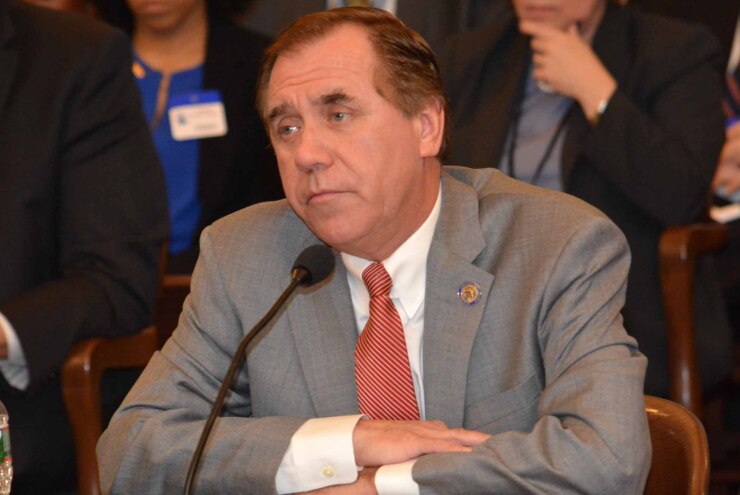New Jersey Gov. Phil Murphy’s emergency bonding plan to patch revenue gaps caused by the COVID-19 pandemic faces an uncertain future in the state legislature.
Assembly Speaker Craig Coughlin, D-Fords, is supporting Murphy’s

Coughlin gave his backing to Murphy in late April at the same time that Senate President Steve Sweeney, D-Gloucester, said he was not convinced yet on the need to borrow through the Fed
The “New Jersey COVID-19 Emergency Bond Act” first proposed by Murphy in mid-April would grant special borrowing powers enabling bonding for sustaining operating costs that are normally constitutionally forbidden. New Jersey’s
The debt proposal slated for an Assembly vote would authorize the issuance of general obligation bonds and “emergency” liquidity notes. The bonds would be repaid through sales and property tax revenues, according to a draft of the bill. State and municipal taxes would be increased if funds were insufficient to meet debt payments.
“I don't think there's an unending supply at the Fed, even though theoretically there is, and I don't want to miss our window,” Murphy said during his COVID-19 daily briefing Wednesday. “I want to make sure we're at the front of the queue and not the back of the queue.”
The Murphy administration tapped the New Jersey law firms of Chiesa, Shahinian & Giantomasi PC and Jeremy Ostow, Esq. as bond counsel to craft the borrowing proposal. Neither firm responded to requests for comment.
Coughlin embraced borrowing as a mechanism to address New Jersey’s fiscal challenges after State Treasurer Elizabeth Maher Muoio detailing projected
As of Thursday, 11,401 people in New Jersey had died from COVID-19,
“To help us through the unique challenges and the significant revenue loss the coronavirus public health emergency has caused, I will support legislation to responsibly borrow funds to make up for our substantial revenue shortfall and stimulate our economy,” Coughlin said in a statement. “While not ideal, I will support the borrowing of necessary funds through bonding, provided the sacrifice is spread evenly and that proper Legislative oversight is included, to ensure our economic position is strengthened for both the present and future.”
Sweeney hasn’t ruled out supporting a borrowing plan, but has noted concerns during the past month about Murphy’s proposal allowing bonds to be issued with a maturity of up to 35 years.
Aides to Sweeney told The Bond Buyer that he would prefer not rushing the bonding vote and would prefer holding off until July when the state has a better sense of its revenue picture. The state matched the federal government by moving the income tax filing deadline to July from April.
Sweeney's aides also said the senator wants to avoid another downgrade to New Jersey’s bond ratings that are the second worst of all U.S states ahead of only Illinois.
Fitch Ratings
Fitch analyst Marcy Block said New Jersey’s strong relationships with investment banks from past borrowings arm the state with multiple borrowing options beyond the Fed program. Block said New Jersey might opt for private placements as another tool to gain market access with lower interest rates from what the lending facility offers.
“Going the private placement route is very helpful if you can get competitive rates,” Block said. “I don’t see them putting all their eggs in one basket.”
New Jersey
Muoio is estimating a $2.757 billion, or 7%, drop from initial 2020 fiscal year revenue projections and the Murphy administration has
The revised revenue estimates were based on an assumption of no resurgence of statewide COVID-19 cases later this year.
The projections also did not factor in revenue raisers proposed in Murphy’s original $40.9 billion 2021 budget plan on Feb. 25 prior to the virus’s outbreak such as a millionaire’s tax that would net the state around $500 million.
New Jersey received $2.4 billion of federal aid under the CARES Act, to reimburse for direct COVID-19-related expenses and not for patching tax revenue losses.
Muoio said in testimony before the Assembly Budget Committee Thursday that more “robust” federal funding and an ability to borrow will be crucial for the state to avoid “substantial” cuts to balance the 2021 budget.
“The difficult decisions in the Governor’s proposed budget for the remaining fiscal year and the three-month extension demonstrate our enormous need for additional federal assistance as well as legislative authorization to borrow in order to ensure our cash flow,” Muoio said. “We are going to require federal assistance and the ability to access borrowing facilities in order to meet our obligations.”





